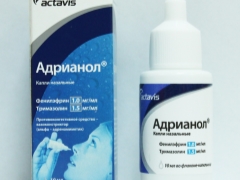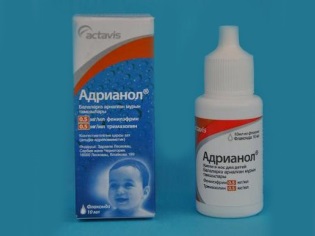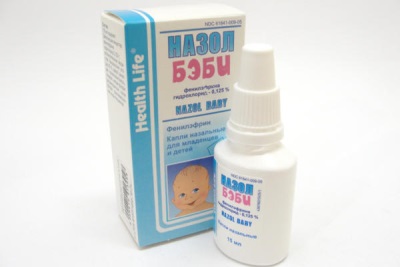Adrianol nose drops for children
ENT doctors in their practice often prescribe nasal drops with a vasoconstrictor effect, among which is the medicine Adrianol. But can it be used to treat children?
Release form
Adrianol is produced in liquid form in bottles of polyethylene with a dropper cap with a capacity of 10 ml. The solution inside the bottle is transparent. It is usually colorless, but may have a slightly yellowish tint.

Composition
The main components in Adrianol drops are 2 compounds:
- Phenylephrine.
- Trimazolin.
Depending on the concentration of such substances, Adrianol is presented in two variants:
- Nasal drops. Every milliliter of this drug has 1.5 mg of trimazolin and 1 mg of phenylephrine.
- Nose drops for children. One milliliter of this drug contains 0.5 mg of the above active substances.
Auxiliary components of both types of Adrianol drops are water, citric acid monohydrate, glycerol and methylcellulose, as well as sodium hydrogen phosphate and benzalkonium chloride.
Operating principle
Adrianol belongs to the group of vasoconstrictor drugs that are applied topically. Its active ingredients are adrenomimetics - substances that activate adrenergic receptors in the human body (in particular, alpha-1 receptors of the nasal mucosa). Such compounds act on the vascular walls and their smooth muscles, as a result of which the vessels narrow.
Take a look at the release of Dr. Komarovsky’s program, which discusses the pros and cons of vasoconstrictor drops for children:
Under the influence of Adrianol, the secretion in the nasal cavity is reduced, and the swelling of the mucous is eliminated, thereby facilitating breathing through the nose. In addition, blood flow to the sinuses decreases. For such effects, Adrianol is referred to as anti-congestants (decongestants).
Indications
Most often, Adrianol is prescribed for rhinitis and sinusitis. The tool is recommended both for the acute form of these diseases and for chronic inflammation. Also, Adrianol is used by doctors during surgical or diagnostic manipulations in the nasal cavity, for example, when removing adenoids.
At what age is it allowed to take?
Adrianol nasal drops are not used in the treatment of children under 7 years of age. The children's version of drops with a reduced dosage of active ingredients is allowed to apply a little earlier - from the age of three. Up to 3 years, the use of Adrianol is not recommended.
Contraindications
The drug is not used in such cases:
- If there is intolerance to any of its components.
- With the atrophic form of rhinitis.
- With glaucoma.
- In severe renal pathologies.
- With thyrotoxicosis.
- If the child has pheochromocytoma.
- With increased blood pressure.
Do not use Adrianol and during pregnancy, as well as nursing moms. Studies of the effect of its active substances on the development of the fetus and the newborn baby have not been conducted, therefore the risk of possible negative reactions of the infant is increased. However, some doctors allow the use of Adrianol in the third trimester, emphasizing that the effect of the drug is only local.

Side effects
After the introduction of Adrianol into the nasal cavity, the following local reaction is possible:
- Swelling of the mucosa.
- Burning sensation.
- Nose pain.
- Sensation of dryness in the nose.
- The appearance of heavy discharge from the nose.
- Loss of taste sensitivity.
Instructions for use of the drug also inform about possible systemic adverse reactions, represented by headaches, rapid pulse, increased blood pressure, allergies, nausea, dizziness.
If Adrianol is used too long, it threatens with nasal congestion and the development of rhinitis. Also a side effect of using this drug for more than a week is mucosal atrophy in the nasal cavity.
Instructions for use and dosage
- Adrianol drops for children are used over the age of 3 years at a dose of 2 drops in each nostril. The drug is injected into the nasal cavity three times a day.
- From the age of 7, you can use Adrianol nasal drops recommended for adults. This drug is administered 4 times a day, and a single dosage can be from one to three drops for each nasal passage.
- To use the drug in the treatment of rhinitis or sinusitis should be no longer than 7 days. This limitation is associated with a gradual decrease in the therapeutic effect. If you plan to use the medicine further, you can continue instillation of the nose after a few days, when the sensitivity to the active substances of Adrianol is restored.
Overdose
If you exceed the dosage of drops in childhood, it will cause:
- Nausea
- Dizziness.
- Tachycardia.
- Fatigue
- Insomnia
- High blood pressure.
- Increased temperature.
- Reflex slow pulse.
- Shock
Interaction with other drugs
Adrianol should not be used together with MAO inhibitors, since such a combination of drugs will increase blood pressure. For this reason, drip nose Adrianol not advised within ten days after the use of MAO inhibitors. Also, the risk of hypertension increases with the simultaneous use of Adrianol and antidepressants.
Terms of sale
A pharmacy does not require a doctor's prescription to buy Adrianol drops.but specialist advice is advisable. The average price of packing drops for children is 110 rubles.
Storage conditions and shelf life
Adrianol should be used before its expiration date, which is 3 years. The drug should be stored at home at a temperature not exceeding + 25 ° C. The storage place of the medicine should not be too wet. Do not keep Adrianol in direct sunlight. It is also important to take care of the inaccessibility of the drug for young children.
Reviews
In most cases, parents are satisfied with the use of Adrianol in childhood. Their reviews of the drug are mostly positive. Moms confirm that Adrianol copes well with nasal congestion, which brings great discomfort to the child with a cold.
The effect of the drug is noted almost immediately after the introduction of droplets in the nose, after which the child can safely eat and sleep without any problems. The advantages of Adrianol include low cost of medication. As for the shortcomings, many mothers complain about an inconvenient dispenser in a bottle, as well as addiction to the drug, because of which the duration of treatment must be limited.
Analogs
Adrianol can be replaced with drugs from the group of adrenomimetics, which are also used to constrict blood vessels in the nasal mucosa. Analogue of Adrian can be called:
- Vibrocil. In addition to phenylephrine, this drug contains the histamine receptor blocker dimetinden, so it can be used for allergic rhinitis. Remedy in drops may be prescribed from birth, and Vibrocil in the form of a spray - children older than 6 years.
- Evkazolin Aqua. This xylometazoline-containing spray has been used since the age of six.
- Nazivin. This medicine based on oxymetazoline is released in drops with different concentrations, as well as in the form of a nasal spray. Droplets of 0.01% are used from birth, the drug of 0.025% can be used from 1 year, and drops and spray of 0.05% from six years.
- Knoxpray. This medicine containing oxymetazoline is available as a spray. It is used in the treatment of children 6 years and older.
- Otrivin. This xylometazoline-based spray has been approved for use since the age of 12.
- Dr. Theiss Nazolin. Such an aerosol, the main component of which is xylometazoline, has been approved since 6 years of age. Due to the presence in the composition of eucalyptus oil, the drug additionally moisturizes the mucous.
- Sanorin. The active component of such a drug is naphazoline. Drops are used over the age of 2 years, and spray - from 15 years of age.
- Nazol Baby. Such drops contain phenylephrine and are prescribed from birth, and the drug with a higher concentration of phenylephrine Nasol Kids is used from 4 years of age.
Also in the treatment of rhinitis, you can use other medications that help to quickly eliminate such inflammation, for example, drops Aqua Maris Strong or Marimer.

























